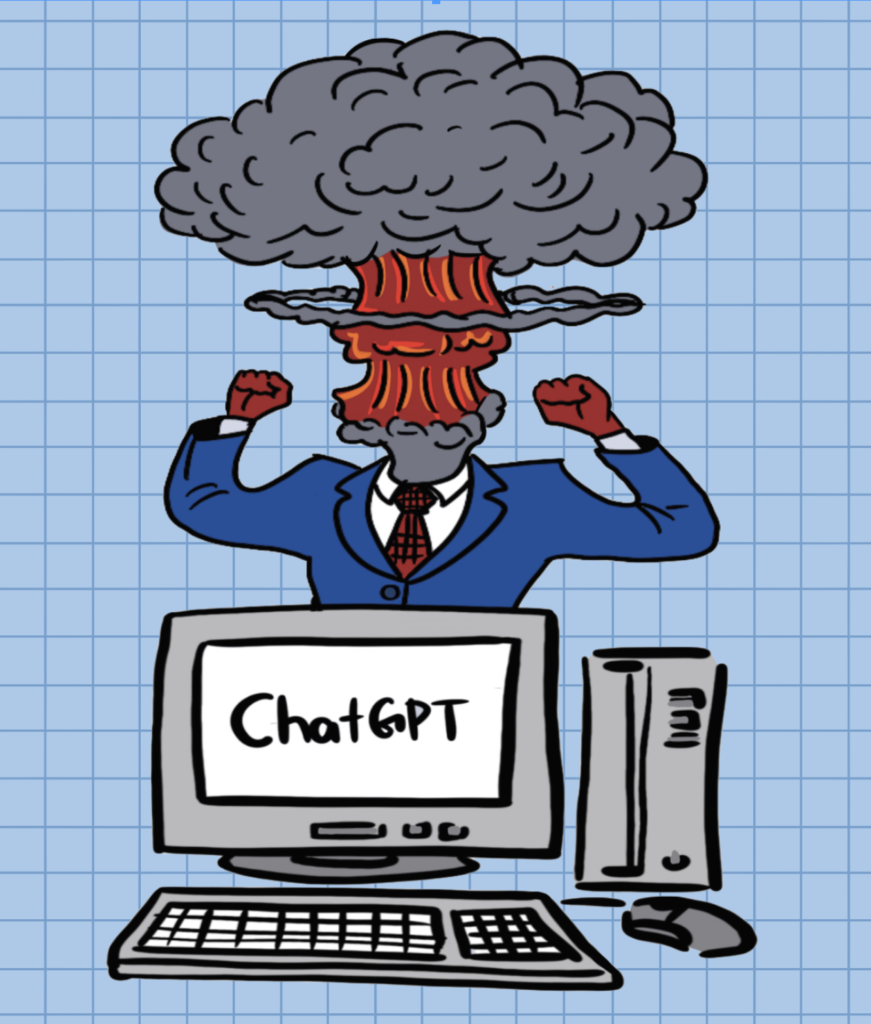
ChatGPT is an artificial intelligence (AI) chatbot with an auto-generative system developed by the company Open AI this past November. While the initial release was months ago, ChatGPT has become increasingly popular in recent weeks. The AI functions in a conversational way, powered by large amounts of data and computing techniques to make predictions and string words together in a meaningful way. The results are eloquent enough to pass standardized tests, write essays, and perform in special fields such as programming and music production. Its data is sourced from textbooks, websites, and articles, which ChatGPT uses to model its own language for responding to human interaction.
Choate has recently encountered an influx of ChatGPT users, as it has become an area of interest for many students and faculty. Dean of Students Mr. Michael Velez ’00 shared how the novelty of ChatGPT has made it one of the biggest challenges the Administration currently faces. He said, “AI has been around; open sourcing has been around. We’ve navigated those, but ChatGPT in some ways presents a novel platform that we have encountered in other forms, if you think of translation software, use of tutors, [and] other resources that are pretty concretely under our academic integrity policy.”
While Mr. Velez personally sees ChatGPT as a violation of the academic integrity policy, as it is a “form of unauthorized aid,” he shone a positive light on the platform at the same time. Looking to the future, Mr. Velez said, “Given the recency of the program being unveiled, the School’s next step is to articulate a stance or position.”
Mr. Morgan Harris, Director of Academic Technology, recognizes the importance of ChatGPT and its ability to both help and hurt students. He noted that while he has “not personally seen any students use it yet,” a group faculty from every department has been exploring the platform to find the ways it can be used.
Mr. Harris, however, also feels that ChatGPT can be a “BS fountain.” He commented, “The nature of AI is to comb through various outputs that humans have put out there and try and synthesize its own way. So, it’s artificial intelligence, but that is not to be confused with consciousness.” He noted that AI can only do what humans have already done, and it has trouble incorporating creativity and art in its responses.
Mr. Velez added that many colleges and universities are acting upon ChatGPT already. The widespread negativity around ChatGPT makes him note that “when technology is put under the spotlight for negative reasons, it has forgotten the positive aspects that these technologies can offer.”
When asked if all teachers and administrators were aware of ChatGPT, Mr. Velez said, “The deans are definitely aware — teachers, more or less. One of the challenges is detecting, and I know now there are bots that can detect if a writing was ChatGPT, and are still being examined.”
While Mr. Velez has not seen students using the bot firsthand, he has heard anecdotally about students using it, but often “in curious, expository ways” with the intent to “just to see how the platform operates.” This curiosity towards ChatGPT’s capabilities is shared by the Deans’ Office, which has also “gone onto it to see what it is able to produce.”
Hannah Quan ’26 shared her perspective as a student. She said, “Personally, I haven’t used ChatGPT, but I know some friends who use it. Some people use it as a new, advanced Google — a sort of search engine to find facts —while others play around with it. I don’t know of anyone who uses it in a negative way.”
While the School has not yet done anything to ban students’ usage of ChatGPT, there may be regulations put in place. Given how advanced the technology already is, it will be interesting to see how the platform will flourish in the future.




